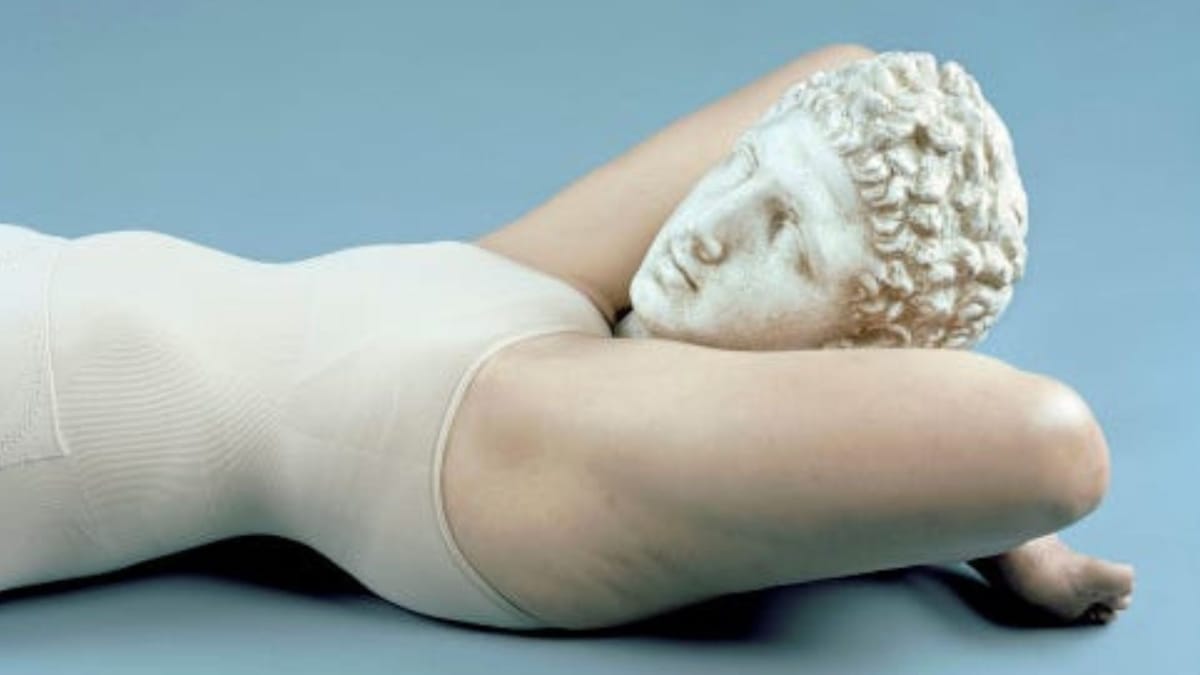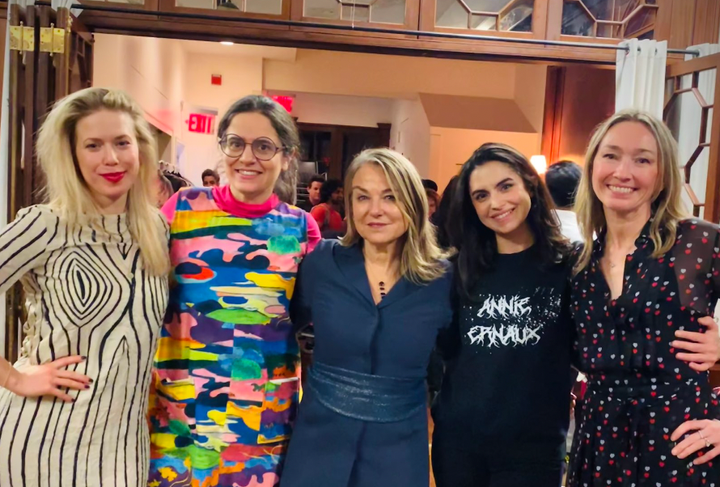Anna Gát: What to Read This Weekend #53
RIP Navalny. This week we're reading about Russia and America, presidents and friends, marriage and loneliness, media layoffs and euthanasia — and Nietzsche, Whitman, Moloch, George Eliot, Socrates...

RIP Navalny. This week we're reading about Russia and America, presidents and friends, marriage and loneliness, media layoffs and euthanasia — and Nietzsche, Whitman, Moloch, George Eliot, Socrates...
Subscribe to Anna’s weekly digest on the Interintellect Substack.
Hello everyone. This has been a crazy day with some very sad news from Russia. We’re all processing.
Regardless, I’ve read so many good pieces this past week that it’s hard to keep it all within Substack’s length limit. So I’m keeping this intro short other than a few quick announcements:
The video from medieval literature professor Irina Dumitrescu’s Interintellect salon is now online! We covered the medieval origins of self-help and morality, spirituality and society, sexuality and health, perfectionism and anxiety, censorship and learning. Plus Margery Kempe, Boethius, Julian of Norwich, Boccaccio... Video here. The New York Review’s interview with Irina here. Enjoy!

New on Interintellect:
From Aliens to the New Age: Alternative Spirituality and the American Counterculture — theology professor and author Matthew Bowman in conversation with novelist and theologian Tara Isabella Burton, March 13, online.
I’ll be at Yale in April for an in-person Interintellect salon with Agnes Callard, Elizabeth Bruenig and Yale University Press’s Jennifer Banks, to talk about forgiveness — and deterrence, apology, cancel culture, making mistakes, and how to live on this Earth together. More soon. Also, more soon on my guest lecture at Columbia on April 17 - so honoured!
Tomorrow (February 17), I’m hosting our first Book Therapy x Valentine’s Day Singles Mingle online. Come and talk about your favourite book to other singles, and introduce yourself this way. Fun! And on Tuesday, I’ll be interviewing two Interintellect hosts about their respective “Kinderintellect” series about how to reform parenting and education — join us…
I can’t tell you why yet but if you’re in New York, keep April 13 open 😉 Until then, I warmly recommend Grace Bialecki’s in-person series in Manhattan, one of my favourites on our platform at the moment.
And now: let’s read!
Why Russia Killed Navalny
Navalny is now presumed dead. The Russian prison system has said he collapsed after months of ill health. Perhaps he was murdered more directly, but the details don’t matter: The Russian state killed him. Putin killed him—because of his political success, because of his ability to reach people with the truth, and because of his talent for breaking through the fog of propaganda that now blinds his countrymen, and some of ours as well.
- Anne Applebaum; The Atlantic
The Good Wife (2021)
After the Kremlin poisoned her husband, Yulia Navalnaya waged an epic battle to save his life and the life of Russia’s opposition movement. It’s a fight she has no intention of losing… In a country that hasn’t had a first lady since Putin’s divorce, announced in 2013, here was a political wife who could more than hold her own in an almost exclusively male arena.
- Julie Ioffe; Vanity Fair
Is the Media Prepared for an Extinction-Level Event?
What will emerge in the wake of mass extinction, Brian Morrissey, another media analyst, recently wrote in his newsletter, “The Rebooting,” is “a different industry, leaner and diminished, often serving as a front operation to other businesses,” such as events, e-commerce, and sponsored content. In fact, he told me, what we are witnessing is nothing less than the end of the mass-media era. “This is a delayed reaction to the commercial Internet itself,” he said. “I don’t know if anything could have been done differently.”
- Clare Malone; The New Yorker (HT Dylan Matthews)
The many meanings of the age of upheaval
In Madame Bovary, published in 1857, seven years before Journey to the Centre of the Earth, Gustave Flaubert channels a sense of unrest and dissatisfaction into geological imagery: even in this rarefied age, tectonic forces are never far from the surface. At a crucial waymark on Madame Bovary’s journey from respectability to perdition – her first exposure to a world beyond provincial shabbiness at a country ball hosted by local aristocrats – Flaubert concludes: ‘Her journey to Vaubyessard had made a hole in her life, like one of those great crevices that a storm will sometimes make in one night in mountains.’
- Alastair Benn; Engelsberg Ideas
Dating Nietzsche: Love vs Power
Conceivably, a woman and a man in a romantic relationship could be opposite to each other without being combative. Nietzsche explains the routine adversariality of heterosexual love as emanating from a tension between gender equality and romantic love.
- Dr Tom Digby; Institute of Arts and Ideas (HT Anita Leirfall)
The Difference Between Science and the Humanities Is Reading the Classics
If you’re interested in philosophy, you have to read Plato and Aristotle — and Kant, and Nietzsche, and Sartre, and so on and so forth. If you’re interested in English literature, you have to read Shakespeare and many others. If you’re interested in religion, you have to read the old sacred texts as well as theologians from centuries ago. It’s fine to read about all these famous philosophers and poets and thinkers, but it’s no substitute for the real thing. In science, this doesn’t apply. A physicist needs to know about Newton and Einstein’s ideas, but doesn’t need to read the Principia Mathematica or “On the Electrodynamics of Moving Bodies” in the original German. A biologist must have a solid grasp of Darwinian evolution, but reading On the Origins of Species is interesting for its historical value only. If you just want the science, you might as well read a recent textbook or paper.
- Étienne Fortier-Dubois
Meditations On Moloch (2014)
There’s a passage in the Principia Discordia where Malaclypse complains to the Goddess about the evils of human society. “Everyone is hurting each other, the planet is rampant with injustices, whole societies plunder groups of their own people, mothers imprison sons, children perish while brothers war.”
The Goddess answers: “What is the matter with that, if it’s what you want to do?”
Malaclypse: “But nobody wants it! Everybody hates it!”
Goddess: “Oh. Well, then stop.”
The implicit question is – if everyone hates the current system, who perpetuates it? And [Allen] Ginsberg answers: “Moloch”.
- Scott Alexander — I’ve taken upon myself to re-read this monster of an essay once again, and it never stops being absolutely mind-blowing. Every sentence is quotable, just work through it if you dare.
Geography is not destiny: A quantitative test of Diamond's axis of orientation hypothesis
Jared Diamond suggested that the unique East-West orientation of Eurasia facilitated the spread of cultural innovations and gave it substantial political, technological and military advantages over other continental regions. This controversial hypothesis assumes that innovations can spread more easily across similar habitats, and that environments tend to be more homogeneous at similar latitudes. The resulting prediction is that Eurasia is home to environmentally homogenous corridors that enable fast cultural transmission. Despite indirect evidence supporting Diamond's influential hypothesis, quantitative tests of its underlying assumptions are currently lacking… Our findings highlight the perils of single factor explanations and remind us that even the most compelling ideas must be thoroughly tested to gain a solid understanding of the complex history of our species.
- Angela M Chira, Russell D Gray, Carlos A Botero (HT Paul Graham)
Beware the Man of Many Studies
Because of how often preregistered replications vindicate the explanation being largely or entirely publication bias, I tend to expect it to explain results far more often than scaling failures do.
- Crémieux
On Writing
The novelist Jennifer Egan says, “You can only write regularly if you’re willing to write badly. You can’t write regularly and well. One should accept bad writing as a way of priming the pump, a warm-up exercise that allows you to write well.”
- Rob Henderson
Why I Gave Away My Company To Charity (2009)
I created a charitable trust called the Independent Musicians Charitable Remainder Unitrust. When I die, all of its assets will go to music education. But while I’m alive, it pays out 5% of its value per year to me.
- Derek Sivers
Grand Gestures — Two meditations on extravagant love
Fundamentally, I think you’re asking: Do we ever really feel uncertain about each other anymore? Is there space for us to imagine each other and desire each other from a distance when we’re prodded by facsimiles of each other online? The question that underlies this, in turn, is: Do we experience romance as we’ve inherited it from history and art—full of prohibition, mystery and yearning?
- Lillian Fishman; The Point
Trump’s threat to let Putin invade NATO countries
The nations that see no need to have workable martial capabilities at all are a real threat to NATO, and yes this includes Canada, which shares a very large de facto Arctic border with Putin, full of valuable natural resources. Even a United States led by Nikki Haley cannot do all the heavy lifting here. What if the U.S. is tied down in Asia and/or the Middle East when further trouble strikes? That no longer seems like such a distant possibility. And should Western Europe, over time, really become “foreign policy irrelevant,” relative to the more easternmost parts of NATO? That too is not good for anybody.
- Tyler Cowen
Why Americans Suddenly Stopped Hanging Out
And so what? one might reasonably ask. Aloneness is not loneliness. Not only that, one might point out, the texture of aloneness has changed. Solitude is less solitary than ever. With all the calling, texting, emailing, work chatting, DMing, and posting, we are producing unprecedented terabytes of interpersonal communication. If Americans were happy—about themselves, about their friends, about their country—then whining about parties of one would feel silly. But for Americans in the 2020s, solitude, anxiety, and dissatisfaction seem to be rising in lockstep.
- Derek Thompson; The Atlantic
Walt Whitman’s Boys (2021)
In 1955, Allen Ginsberg, the most Whitmanic modern poet and the inheritor of Whitman’s mantle of public oracle and oversexed national spokesman, wrote “A Supermarket in California,” which contains the line: “I saw you, Walt Whitman, childless, lonely old grubber, poking among the meats in the / refrigerator and eyeing the grocery boys.”
- Jeremy Lybarger; Boston Review
What’s Your Type?
Typicality is an old problem, perhaps the oldest of them all for the novel. The best articulation of it can be found in Catherine Gallagher’s tremendous essay “George Eliot: Immanent Victorian,” published almost twenty years ago. Since the eighteenth century, Gallagher argues, the novel has been legible to its readers as a series of fictional utterances about imaginary beings, as opposed to a series of libelous claims about people whom the author knows in her actual life. The distinction between fiction and reality can be drawn with confidence because the novel engages in “the creation of instances, rather than their mere selection, to illustrate a class of persons.” These classes of people—what Henry Fielding called “species,” Henry James “specimens,” and Eliot “types”—are the abstract entities derived from examples of flesh-and-blood people; at the same time, the abstraction serves as the blueprint from which specific characters are created. Type is a marvelous double-hinged mechanism, with similar but opposite relations to real people and fictional characters. Swing it to one side, and it binds the novel to the world; swing it to the other, and it frees the novel from it.
- Merve Emre; The New York Review — so damn good, always
The road from serfdom
Does improving institutions inevitably take a long time and involve conflict?
- Samuel Watling; Works In Progress
The Lure of Divorce
I wondered if my marriage would always feel like a competition and if the only way to call the competition a draw would be to end it.
- Emily Gould; The Cut
Why Is the American Right Pandering to Putin?
All of which is to say the center of Moscow is a bitter Potemkin joke. But Carlson, in his interview with Putin—which took place at the Kremlin on February 6, aired on X two days later, and has so far racked up more than 200 million views—failed to reveal any of that.
- Peter Savodnik; The Free Press
Math as a Liberal Art (2018)
In Plato’s Republic, Socrates called this curriculum the “quadrivium,” and he said it’s likely that this study is really compulsory for us, since it evidently compels the intellect to use the intellect itself on the truth itself. Socrates’ thesis is that the study of four mathematical arts constitutes a necessary intermediate station on the path out of the cave of received opinions and toward philosophical dialectic.
- Eve Tolpa interviews Topi Heikkerö; St. John’s College
Romance versus realism — The origins of the novel
How, when and why did novels start? Conventionally, people used to say two things, in the main: that Daniel Defoe’s Robinson Crusoe (1719) was a game-changer; and the novel started in the “long” eighteenth century. Only Don Quixote was published in 1605, and in critical circles Cervantes’s giant may have eclipsed Defoe’s marooned mariner as the most influential book-that-might-be-called-a-novel there has ever been… Shuffling categories, though, as Nietzsche noticed, is a great way of learning about the category-makers rather than the objects themselves.
- Min Wild; Times Literary Supplement
Game Theory As A Dark Art (2012)
One of the most charming features of game theory is the almost limitless depths of evil to which it can sink.
- Scott Alexander; Less Wrong
'Feud' Creates Nostalgia for Old-School Museum Galas, Where the Rich and Famous Partied
In 1966, Truman Capote organized his Black and White Ball at the Plaza Hotel, drawing 540 guests from his social circle after releasing his book In Cold Blood, which is now regarded as a classic of the true crime genre. His guest list, spanning publishing, media, and the arts, was a rarefied group that recently made it to TV in the form of an episode in the series Feud: Capote vs. the Swans. Among those who appear in that episode are William Paley and Nelson Rockefeller, who also happened to be key cultural patrons of the era.
- Angelica Villa; ARTnews
Gen Z’s Sexual Apocalypse. The Case for Marriage. And: Is It Time to Ditch the Apps?
Ignore Instagram and observe what real people look like now. All you have to do is exercise regularly, get a decent haircut, and wear clothes that fit to enter the top 10 percent of physical attractiveness… If you’re a guy, go ahead and pay. Researchers recently surveyed 552 heterosexual college students and found that young men paid for all or most of the dates around 90 percent of the time.
- Oliver Wiseman; The Free Press
Causally estimating the effect of YouTube’s recommender system using counterfactual bots
We find that recommendations, on average, push users to more moderate content, suggesting that user preferences play the dominant role in determining consumption.
- Homa Hosseinmardi, Amir Ghasemian, Miguel Rivera-Lanas, Manoel Horta Ribeiro, Robert West, Duncan J. Watts
Writing Inside the Holes
“In our world, who keeps her secrets, haunts our city, and flexes her claws? Who sees what we sometimes can't? Who gives us her ragged record of the way things are?” The answer is: the poet as sphinx who “eats raw”…
- Léon Pradeau; Poetry Foundation
Sea Peoples, Heraclids, and Ass Men — Attempting to demystify the Late Bronze Age collapse.
In my innocence, I don’t think I used to have any concrete beliefs about the events of c. 1200 BCE; then I found out that, at that time, the interconnected civilizations of the eastern Mediterranean abruptly collapsed, but not really, at the hands of the mysterious, marauding “Sea Peoples,” who didn’t really exist, except they kind of did. Huh?
- LS (HT Sarah Constantine)
The writing class I’d like to teach (2016)
I don’t care about the topic. I care about the editing. I care about the constant refinement and compression. I care about taking three pages and turning it one page. Then from one page into three paragraphs. Then from three paragraphs into one paragraph. And finally, from one paragraph into one perfectly distilled sentence.
- Jason Fried - please nobody tell this guy about NOVELS
Our Tenured Civ
Compared to untenured but tenure-track academic faculty (most of who will later get tenure), tenured professors put in less effort, are less focused on doing big-win projects, and are less willing to change locations, research sub-fields, or classes taught. They publish less, and change their minds less. But they are also more pompous in their speech; they complain more in public about outcomes for they and their local groups, and are more willing to advocate radical changes in other parts of society….
- Robin Hanson
1791 Mozart's Last Year. H. C. Robbins Landon
In the second half of the year, Mozart was “chronically overworked”, making progress on The Magic Flute before Tito was done, then moving on to the clarinet concerto, starting the Requiem as soon as he finished. He almost never stopped thinking about music. One of his methods of composition was to play billiards. Mozart hummed while he played, then while others took their shots he made notes.
- Henry Oliver — great piece
I'm a neuroscientist. Our presidential candidates have shrinking prefrontal cortexes.
Because it’s well-known that age-related cognitive decline starts around or before 30 and basically never ever stops.
- Erik Hoel
To his coy mistress — The violence of literary passion
To this tradition Henry James adds a refinement, echoing recent American history, the idea not just of battle, but of civil war. It is a detailed parallel. As the Southern states seceded from the Union, so the feminist movement, as James sees it, at its most extreme, wishes to secede from the union of men and women.
- Craig Raine; Times Literary Supplement
Russia is not actually a very nice place to live
The only really great thing about Moscow is its subway, which is generally regarded as one of the world’s best, and which is known for its beautiful stations.
- Noah Smith — prophetic from 3 days ago
Cillian Murphy Is the Man of the Moment
Murphy and his wife of 20 years, artist Yvonne McGuinness, live by the sea with their two teenage sons. In Ireland, the abundance of their creative existence is all around them. The art galleries all seem to be filled with work by his family members. The music on the radio is curated by friends—or Murphy himself. There are occasional pints with his elder Irish actor idols, Brendan Gleeson and Stephen Rea. Life here for Murphy is filled with, well, life. His boys are approaching exit velocity. There are exams. Chores. Errands.
- Daniel Riley; GQ
Slaying Alexander's Moloch (2015)
Usually, the received view among the smart side of the internet is that the many problems of the world are not due to people being intrinsically evil, but ignorant and/or irrational. They aren’t able to see cooperative equilibriums, or get dragged along by emotional responses that end up leading to war, corruption, crime, and so on. Moloch is more fearsome than that, says Scott. Assume we were perfectly rational and intelligent. Moloch is seeing the solutions to our problems, to know what we would have to do to solve them, but not being able to due to bad incentives. A Molochian scenario is a prisonners’ dilemma…
- José Luis Ricón
Inner ear of extinct ape species is overlooked aspect of human bipedal evolution, study finds
"The semicircular canals, located in the skull between our brain and the external ear, are critical for our sense of balance and position when we move, and they provide a fundamental component of our locomotion that most people are probably unaware of," Zhang Yinan … said in a press statement.
- Matthew Rozsa, Salon
The author of bestseller ‘Atomic Habits’ has launched an app to help you reach your goals. Here’s what to know
[James] Clear, whose ethos resides on getting 1% better each day, fighting a lack of willpower, and designing the right environment to build habits, is turning his celebrated lessons into an interactive digital tool alongside tech firm Tiny to track habits and provide mindset guidance—a new app, Atoms, launched today.
- Alexa Mikhail; Fortune
Slack is the opposite of organizational memory (2018)
Somewhere along the way we forgot that interruptions are toxic to real work. It wasn’t always this way. On day 1 of my first trading job the only instruction I received was ‘when the market is open, mute your phone.’ The subtext was ‘or else’. If someone said this to me today I’d give them a hug, and I’m not a hugger.
- Abe Winter - I should read this every year and make my team read it every year too
Friedman’s Rise and Fall
Friedman credited Arthur Burns, his professor at Rutgers in the 1930s and decades later Richard Nixon’s Federal Reserve chairman, with having turned him into an economist. Burns would later call Friedman the greatest economist of his generation. But it was “price theory,” as taught in his years as a graduate student at the University of Chicago, that made a capitalist renegade of Friedman.
- Christopher Caldwell; First Things
Some economics of assisted dying
David Hume, the first modern thinker who approached suicide from a broadly rational choice perspective stated that “no man ever threw away life, while it was worth keeping.” Suicide thus, can be“rational” in an economic sense; the individual ends live whenever her net expected lifetime utility is negative… Individuals tend to choose best when they bear the consequences, both good and band, of their actions. This general principle is compromised in heavily socialized healthcare systems.
- Peter Isztin
Get Tucker Carlson to oppose your preferred policies
Get National Conservatives to absolutely HATE the idea of compensating organ donors. National Conservatives have a huge leg up Bioethicists, because they can come up with levels of cringe that the latter can only dream of. Just take a look at the response to Taylor Swift and her boyfriend Travis Kelce, which they also somehow turned into a left-coded couple. Let the online right come with the worst memes about why organ donation is bad: how it’s not trad, how women cannot make their own choices about their kidneys because they do not possess agency… This will make opposition to this very desirable policy seem low-status and Conservative coded and hopefully will decrease the “disgust response” from the educated left leaning folks who power most policy movements.
- Ruxandra Teslo
Creating excuses for community (2018)
Most elevator rides are awkward. Silence is the default. Conversations need a raison d'être, a reason to exist. You’re not supposed to ask a stranger how their day is going while you wait for your floor. But the tiny TV screen subtly changes the elevator’s implicitly agreed upon social norms. It creates a temporary shared context that gives people an excuse to connect.
- Aaron Lewis
Aging Is No Blessing
No animal ages exactly like we do, which means animal-tested therapeutics may end up not translating…
The U.S. invests only 0.54% of all National Institutes of Health funds into the biology of aging despite the great expenses incurred by this underlying cause. An underlying cause that is becoming much more pressing with the growing gap between health and life expectancy… Our failure to achieve better results in aging science may have as much to do with moral bottlenecks as with scientific ones.
- Raiany Romanni; Palladium
✨ BONUS! I’ve been reading the screenplay for Wonder Boys, so good!
Thank you for reading!
Email me at anna@interintellect.com.
Attend our public online salons here. Join our community and find more great stuff to read and thoughtful people to discuss it with here.



